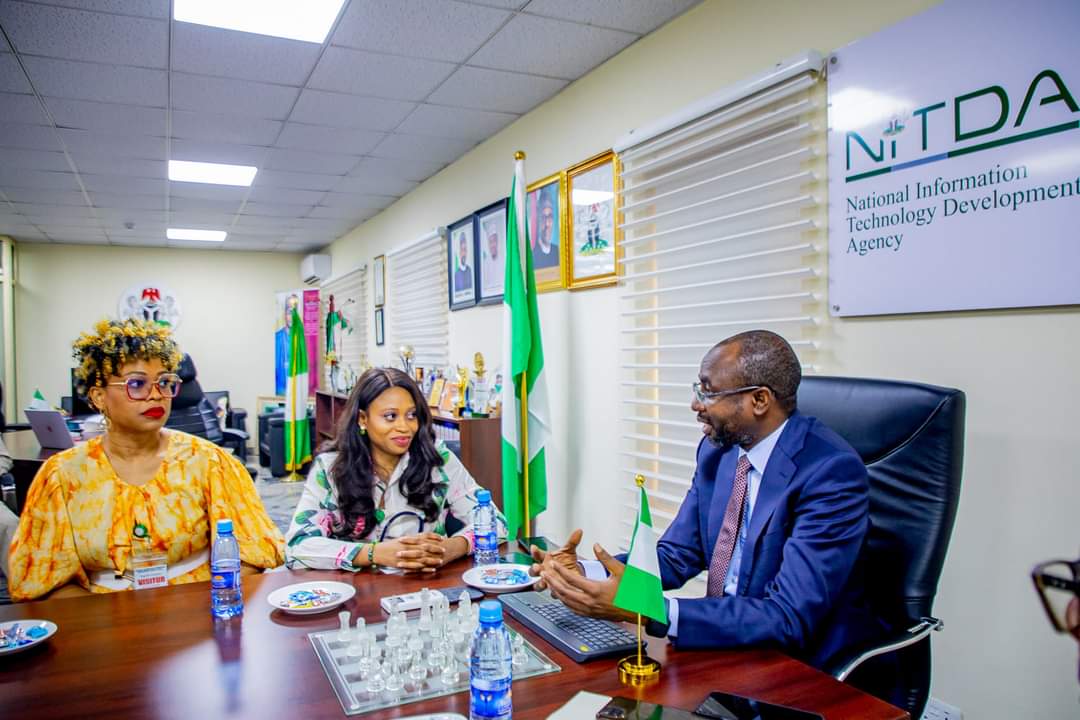E-Business
NITDA, LEAP Africa Collaborate to Harness Youths’ Talents for Economic Growth

National Information Technology Development Agency (NITDA) has agreed partner with LEAP Africa, a non-profit organisation that focuses on leadership development, to harness the potentials of young Nigerians in the field of technology and entrepreneurship, and equip them with the necessary skills to take advantage of the emerging opportunities in the tech industry.

Kashifu Inuwa, Director General of National Information Technology Development Agency (NITDA), made this disclosure during a visit by a team from LEAP Africa led by its Executive Director, Kehinde Ayeni to the Corporate Headquarters of the Agency.
Inuwa lamented that the surge of migration of Nigerian youths to other countries which is largely attributed to the quest for a better life is gradually depleting the nation’s talent resources and consequently made it imperative for the Federal Government of Nigeria to create enabling opportunities through the implementation of developmental guidelines, mentorship programmes, establishment of social infrastructures and funding that will enable innovation and entrepreneurship thrive in the country.
He stated that it is necessary to harness the talents of Nigerian youth and exploit potential for their individual benefits and that of the country, adding that the country has a global competitive advantage due to its large population of young people.
While stating that technology is the major driver of economy globally with people as its critical component, he opined that enormous attention should be given to the needs of innovators in order to create a flourishing and innovative ecosystem in the country.
Speaking on possible areas of collaboration with LEAP Africa, the NITDA boss said that the newly enacted Nigeria Startup Act is an instrument both organisations can leverage to unlock and ignite activities in the innovative and entrepreneurship ecosystem.
He said, “the Act has been signed into law, the Council has been inaugurated, we have developed the implementation framework and we need partners to work together to implement it. We believe in collaboration because we cannot succeed in isolation. So, we need to work together as an ecosystem to achieve that”.
Giving further insight into the ingenuity and prospects of the Act, the DG revealed that the implementation committee has been further broken down into sub-committees to identify thematic areas in catalysing the process.
While highlighting Ecosystem Development, Capacity Building, Funding, Tax and Fiscal Incentives as some of the thematic areas identified, he gave his assurance that the Federal Government is committed to giving infrastructural support to boost the ecosystem, engaging in massive programmes to build capacities in soft skills, providing adequate funding into the ecosystem and influence policies that will act as an enabler to the ecosystem.
Inuwa added that the National Outsourcing Strategy and the National Digital Talent Strategy are other initiatives developed by the agency in upskilling players within the innovative and entrepreneurship ecosystem thereby making them marketable globally.
He added that innovation hub clusters would be built across the country to develop the capacities of talented Nigerian youths and make them marketable globally.
“We want focus on services which are digitally driven and provide the talent to build those services. You can live in Nigeria, then connect to the global value chain and earn better. You don’t need to travel and that’s what will help us to build the Nigeria we want”, he said.
While giving her remark earlier, Kehinde Ayeni said that LEAP Africa in its 20 years of existence has been involved in several projects such as the Social Innovation Programme, Nigerian Youths Futures Fund and the iLEAD programme to build capacities of youth and bridge the digital divide in the country.
She however expressed the organisation’s desire to partner with NITDA to leverage Information Technology in creating solutions to challenges daunting the innovation and entrepreneurship ecosystem in the country.
“As we continue to look at our impact over the last 20 years, one of the shortcomings that we found is what technology could do for us and the power of innovation in ensuring that the Nigeria and Africa that we are striving for is possible”, she concluded.
E-Business
Nigeria Targeted with 4,622 Cyber-attacks Per Week in December 2025

In December 2025, organisations globally faced sustained cyber pressure, as the average number of cyber-attacks per organisation per week reached 2 027, a 1% increase from the previous month and a 9% increase from December 2024.

This is according to December 2025 Global Cyber Attack Statistics by Check Point Research, the threat intelligence arm of Check Point Software Technologies.
According to the statistics, Latin America was the hardest hit, with companies experiencing an average of 3 065 cyber-attacks per week, a 26% year-over-year increase.
In contrast, Africa saw a decline in attacks, with Nigeria (4 622 attacks per week) and Angola (4 002 attacks per week) being the most targeted countries on the continent.
The report’s findings highlight the evolving cyber threat landscape, with ransomware and GenAI-driven data risks posing significant challenges to companies worldwide.
Ransomware attacks jumped 60% year over year, with 945 publicly reported incidents in December. Qilin was the most active ransomware operator, responsible for 18% of publicly disclosed attacks.
“Ransomware continues to scale through industrialised operations, while unmanaged GenAI usage is creating widespread data exposure at enterprise level,” said Omer Dembinsky, data research manager at Check Point Research.
The report noted the education sector was the most targeted industry globally, with 4 349 cyber attacks per week; followed by government (2 666 attacks per week); and associations and non-profits (2 509 attacks per week).
The widespread adoption of GenAI tools has introduced new cyber security risks, with one in 27 GenAI prompts posing a high risk of sensitive data leakage.
Experts warn that companies must prioritise prevention-first security, real-time AI threat intelligence and strong governance over AI tools to mitigate these risks.
Hendrik de Bruin, head of security consulting at Check Point Software, added: “Strengthening ransomware resilience, deploying AI-powered prevention and enforcing clear GenAI governance will be critical to reducing cyber risk in the year ahead.”
E-Business
Half of Global Companies Build SOCs to Enhance Cybersecurity, with a Focus on Human Expertise

Among the primary reasons for establishing a Security Operations Center (SOC) are strengthening cybersecurity posture, enabling faster detection and response and gaining a competitive edge.

Interestingly, despite the increasing demand for automated cybersecurity solutions, businesses rely on skilled security professionals to make key decisions, as human expertise remains essential for effective security management.
A Security Operations Center (SOC) is a dedicated organisational unit responsible for continuous monitoring and safeguarding of a company’s IT infrastructure. Its core mission is to proactively detect, analyse and respond to cybersecurity threats.
To identify the main drivers, strategic priorities, and potential challenges in SOC planning and implementation, Kaspersky has conducted a comprehensive global study involving senior IT security specialists, managers and directors from companies with 500 or more employees.
All participants operate without a SOC but have plans to establish one in the near future. The study spans 16 countries across APAC, META, LATAM, Europe, and Russia, providing valuable insights into the emerging trends and best practices in SOC development worldwide.
The findings of the research reveal that 50% of companies intend to establish SOCs to strengthen their cybersecurity posture, and 45% are motivated by the need to address increasingly sophisticated and dangerous threats.
Other drivers include budget optimisation, the necessity for faster detection and response, and the expansion of software, endpoints and user devices – factors that demand more comprehensive and layered security measures.
These are cited by 41% of organisations. Additionally, 40% seek better protection of confidential information, 39% aim to meet regulatory requirements and one-third (33%) expect SOC capabilities to provide a competitive edge. Larger enterprises tend to cite each of these reasons more often, reflecting the broader operational and regulatory pressures they experience.
Continuous monitoring becomes the leading SOC requirement
Among the key functions organisations plan to delegate, 24/7 security monitoring leads at 54%. This around-the-clock vigilance enables early detection of anomalies, prevents escalation and sustains cyber resilience in real-time. This demand highlights a strategic requirement for proactive risk management, as organisations aim to defend against persistent threats that can strike at any moment.
Companies intending to fully outsource SOC operations show a stronger interest in applying “lessons learned” methodologies, whereas those developing internal SOCs focus more on access management to maintain tighter control.
Human expertise drives SOC technology choices
While SOCs use advanced technology, the choices made by organisations show that human analysts are very important. Among the solutions that organisations plan to include in SOC are – Threat Intelligence Platforms (48%), Endpoint Detection and Response (42%) and Security Information and Event Management systems (40%) – sophisticated solutions that automate data collection and reduce operational load, however, they depend heavily on skilled security professionals who provide critical context, interpret complex findings and make final decisions when guiding appropriate responses.
Other solutions chosen include Extended Detection and Response (38%), Network Detection and Response (37%) and Managed Detection and Response (33%). Large enterprises tend to adopt more technologies (5.5 per SOC on average), while smaller ones integrate fewer (3.8).
“To successfully build a SOC, companies must prioritise not only the right mix of technology but also the careful planning of processes, clear goal-setting and effective resource distribution.
“Well-defined workflows and continuous improvement are essential to ensure that human analysts can focus on critical tasks, making the SOC a proactive and adaptable component of their cybersecurity strategy,” comments Roman Nazarov, Head of SOC Consulting at Kaspersky.
E-Business
Nigerian Terra Industries Secures $11.8m for Expansion

Terra Industries, a Nigerian defence technology startup, has raised $11.75 million to expand its development of defensive systems that protect critical facilities across Africa.

The fundraising round was led by Silicon Valley venture firm 8VC, which was founded by Palantir co-founder Joe Lonsdale.
Other investors in the round include Valour Equity Partners, Lux Capital, SV Angel, and Nova Global, as well as African-focused funds Tofino Capital, Kaleo Ventures, and DFS Lab.
Terra Industries, founded in Abuja by Nathan Nwachuku and Maxwell Maduka, provides multi-domain security solutions for both air and land. Its solutions are intended to detect and respond to threats including terrorism, sabotage, and armed attacks on infrastructure.
The company’s product portfolio includes surveillance drones, ground-based robotic systems, and fixed monitoring towers deployed around sensitive locations.
Co-founder and CEO Nathan Nwachuku said the company has now fully embraced its identity as a defence-focused startup, citing the growing urgency of security challenges across Africa.
He said safeguarding critical infrastructure from terrorist threats has become unavoidable.
Nwachuku argues that protecting Africa’s infrastructure requires a different approach, one that combines local manufacturing, end-to-end system control, and software capable of independently identifying and responding to threats over large areas.
The company aims to position itself as a defence prime, similar to the role played by firms such as Anduril Industries and Palantir in the United States.
Nwachuku also disclosed that the company had earlier raised $800,000 in pre-seed funding.
With the new funding, Terra plans to increase manufacturing capacity within Africa, establish additional defence production facilities, and expand its artificial intelligence and software teams.
While software offices are planned for San Francisco and London, the company said manufacturing operations will remain on the continent.

 E-Financial3 days ago
E-Financial3 days agoAngst as FG Demands 7.5 Percent VAT on Mobile Bank Transfers, USSD

 News3 days ago
News3 days agoMoniepoint Launches Second Cohort of DreamDevs Initiative to Double Down on Africa’s Tech Talent Pipeline

 E-Financial3 days ago
E-Financial3 days agoNGX lists 3.156bn UBA shares, boosting capital to N513Bn

 E-Financial3 days ago
E-Financial3 days agoThe Missing Pieces in Nigeria’s Banking Recapitalisation

 Telecom3 days ago
Telecom3 days agoGlo Unveils Immersive Gaming Experience, Travel Saga

 E-Business3 days ago
E-Business3 days agoHalf of Global Companies Build SOCs to Enhance Cybersecurity, with a Focus on Human Expertise

 General News3 days ago
General News3 days agoNITDA DG Reaffirms Nigeria–U.S. Partnership on Data Privacy, AI and Cybersecurity

 E-Financial2 days ago
E-Financial2 days agoPaystack Expands Beyond Payments into Banking

























